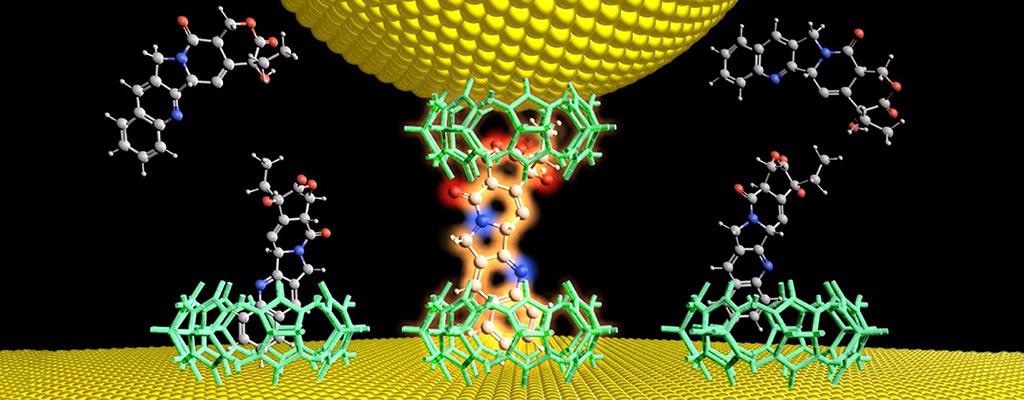Controlling electrical impulses with single molecules allows transistors in integrated circuits to be miniaturized to the atomic level. This field of molecular electronics research paves the way not just for the next generation of supercomputers, but also for whole new electronic systems and methodologies.
 Gold electrodes (yellow) equipped with organic macrocyclic receptors (green) allow the capture of single drug molecules from aqueous solution (center) and the measurement and analysis of their electrical conductivity. Image Credit: Angewandte Chemie.
Gold electrodes (yellow) equipped with organic macrocyclic receptors (green) allow the capture of single drug molecules from aqueous solution (center) and the measurement and analysis of their electrical conductivity. Image Credit: Angewandte Chemie.
A technique for detecting the conductivity of individual pharmacological and biological molecules has been devised by researchers from Jacobs University Bremen and Wuhan University of Science and Technology in China.
The editors of the famous journal Applied Chemistry (“Angewandte Chemie”), which was founded in 1887, have chosen the results of their recently published scientific study as a “Hot Paper.” The topic is deemed extremely important in a fast-evolving field of research by the publication.
Single molecules are stretched between two electrodes to produce an electrically conducting component in which molecular conductivity is measured in molecular electronics.
Even though the underlying method for this occurrence, scanning tunneling microscopy, was granted the Nobel Prize more than thirty years ago, there is still one major limitation: to obtain molecular conductivity, the molecules to be assessed had to be attached directly to the inorganic gold electrodes, generally via sulfur bridges.
We have modified the two electrodes in a way that we can not only determine the molecular conductivity of a single molecule. Rather, we are now able to exchange the compounds at will to measure the conductivities of many different molecules in succession.
Werner Nau, Dean and Professor, Chemistry, Jacobs University
Nau’s lab focuses on creating novel physicochemical methodologies and innovative hybrid molecules for use in life and materials sciences.
Both electrodes in the new electronic measuring setup have been updated with organic macrocyclic receptors (see image) to enable solute molecules to adhere and detach from the junction. In electrical engineering, this is analogous to plug connectors. They enable the exchange of electrical elements, such as replacing damaged components or including those with differing qualities.
Put simply, we have succeeded in introducing electrical plug connections at the level of single molecules. We now use supramolecular instead of covalent bonds at the conducting site. This enables completely new dynamic measurements and effects.
Suhang He, Study Lead Author and Postdoctoral Researcher, Jacobs University
This method also has the benefit of allowing native, unmodified molecules to be investigated, eliminating the need for intrusive sulfur group insertion.
The German-Chinese team is using the newly found supramolecular electrical connections in biosensing to identify clinically relevant substances such as camptothecin, a chemotherapy drug, in their first investigation. It has been possible to illustrate how specific drug molecules are protonated and deprotonated in the new electrical junctions by measuring the change in electrical conductivity, for example.
The novel molecular electronic technique holds the potential for breakthrough molecular computing applications in physics and engineering. This is because it demonstrates how molecule conductor qualities may be readily measured and tested.
Journal Reference:
Xiao, B., et al. (2022) Dynamic Interconversions of Single Molecules Probed by Recognition Tunneling at Cucurbit[7]uril-Functionalized Supramolecular Junctions. Angewandte Chemie. doi.org/10.1002/anie.202203830.